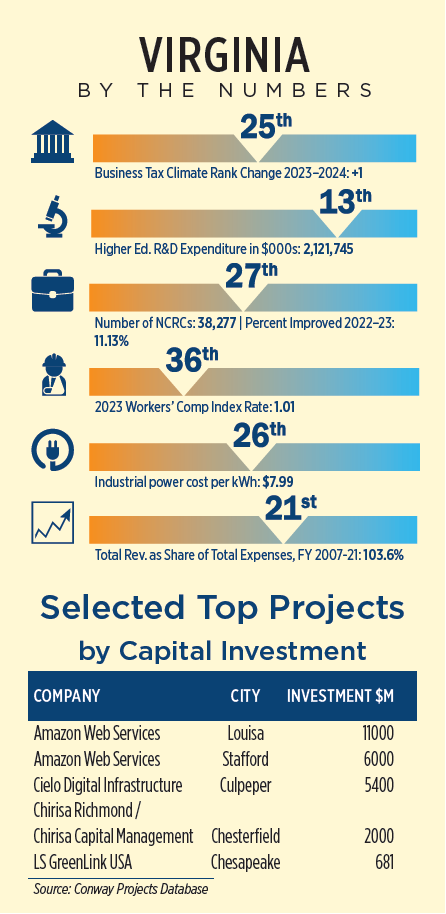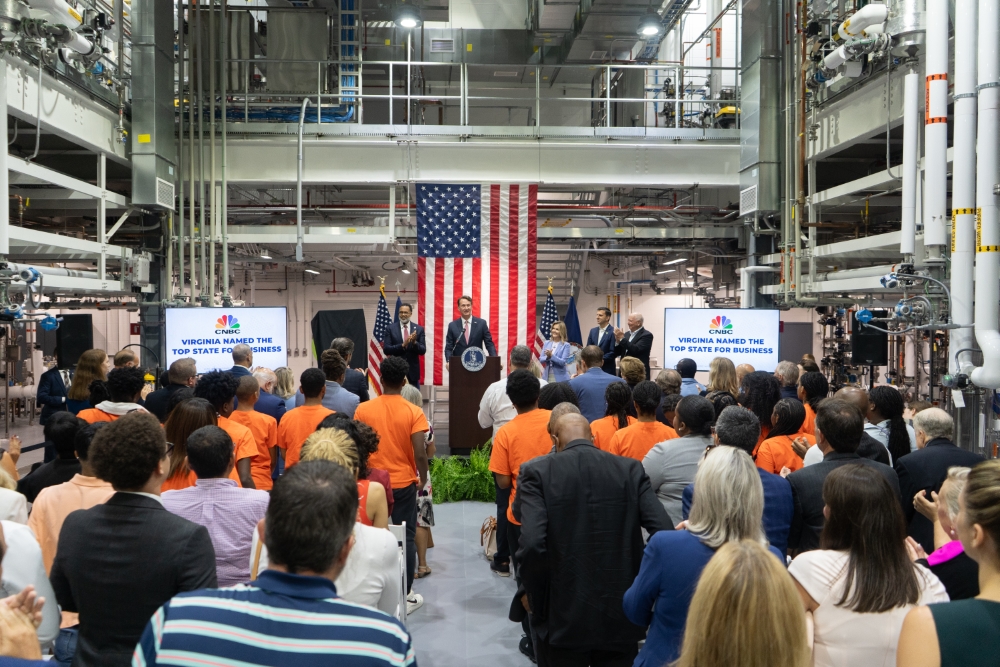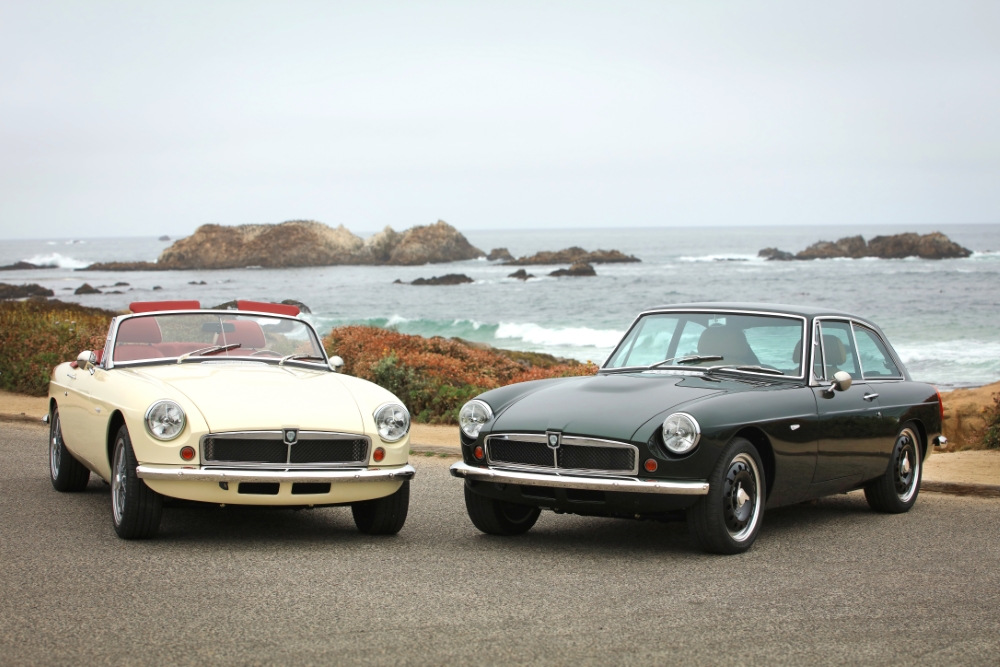Gov. Youngkin says landing more FDI projects will be a top priority.
Peter Swain shifted his classic car company into high gear when he went searching for a new home in America. After all, when you are the only UK company that builds vintage roadsters by hand and puts electric motors in them, you have carved out quite a niche.
RBW Sports & Classics Limited in London recently entered into an agreement with the City of Danville, Pittsylvania County and the Virginia Economic Development Partnership to invest $8 million and hire 144 workers to establish an EV roadster and GT model factory in the Cane Creek Centre in Danville, a town of 42,000 people in south central Virginia.

Old World, welcome to the New World, again. For CEO Swain, establishing a manufacturing beachhead in America was a must if his company wanted to realize its goal of increasing sales in the United States.
RBW was introduced to Danville by another British manufacturer in the area, which lies just north of the North Carolina state line and about 45 miles north of Greensboro. “RBW knew we needed a U.S. location to support U.S. sales growth and were busily considering options,” says Swain. “Upon visiting Danville, several important factors aligned. In the first instance, a willing and welcoming local community and city and state representatives” made RBW feel at home, he adds.
“Most importantly,” he notes, “workplace training initiatives in the colleges with a focus on industry was by far the most advanced we had witnessed anywhere.” Swain credits “the whole Danville development team” with introducing him to the considerable resources of the local technical training team, welding college and other institutions equipping the region’s broad manufacturing base with a regular supply of blue-collar talent.
Swain adds that it was not a foregone conclusion that RBW would locate a plant in Virginia. “We considered our options,” he says. “However, it became apparent, after talking with some key people we met along the way, that this was the right location.”

Virginia Gov. Glenn Youngkin delivers remarks at Phlow Corporation on July 11, 2024, in Petersburg.
Image by Austin Stevens/Office of Governor Glenn Youngkin
Asked for examples of how Virginia demonstrated its business friendliness, Swain says, “They were incredibly helpful from start to finish. First impressions are so important. We found a willing, engaged environment from state leaders and were given a guided tour of ‘like’ businesses and training facilities. We visited four times before our decision. Likewise, state leaders visited our English facility to check out our credentials. It’s a two-way street. We both arrived at a level of comfort to move forward as partners.”
Swain discovered what other investors have found in Virginia: a business-friendly climate with a track record of supplying the technical skills that manufacturers need. When CNBC named Virginia “America’s Top State for Business” earlier this year, it detailed the many factors that propelled the Old Dominion to the top spot. “The state’s public education system is the best in the country, and it took a bipartisan compromise to make it happen,” CNBC wrote in its report. “Virginia is a leader in linking businesses with shovel-ready sites, helping the state finish third in this year’s most important category, infrastructure.” Virginia also earned high marks for its workforce, economy and quality of life.
That CNBC ranking was one factor that helped Virginia to a No. 4 overall ranking in Site Selection’s annual Business Climate Rankings found in this issue. The state is also No. 1 in Inc. 5000 firms per capita, one of the 14 metrics behind the rankings.
Founded in 2017, RBW will benefit from a $500,000 grant from the Commonwealth’s Opportunity Fund to assist Danville-Pittsylvania County with the project. Funding and services to support worker training are being provided through the Virginia Jobs Investment Program. Other assistance came from the Virginia Economic Development Partnership, the Danville-Pittsylvania County Regional Industrial Development Authority and the Southern Virginia Regional Alliance.
Swain says that while he appreciates the incentives, they are not why his firm selected Virginia.
“Incentives are welcome,” he says. “RBW must access the U.S. market anyway. We have not come for incentives. Plus, incentives are rightfully years away from realization. RBW has to deliver on its word to build and grow over the long term, and then incentives are gratefully received.” Those incentives, he adds, will be used to create “more positive ventures at our Cane Creek facility.”
Gov. Youngkin: We Have More Work to Do
Virginia Gov. Glenn Youngkin says that wins like RBW are the fruits of investing in government programs such as public education and site development. When I asked him what he considered to be his administration’s greatest accomplishments in economic development, he said: “First and foremost has been the transformation of the business ecosystem to support all the aspects of supporting the businesses looking to expand here. We need to have sites ready for companies to build on. Virginia had not invested much in site preparation. But since taking office, we have appropriated roughly $550 million for site readiness so that companies can expand quickly.” This included a round of $126 million in state grants for site readiness in August.
His second biggest achievement, he said, is “workforce development. That is critically important. Virginia has been recognized as having the best customized workforce development program in America for two years now. We tie workforce development programs to in-demand jobs. That is how we prepare students for careers.”
All of this starts, though, with investment in education, says Youngkin. “Education is at the foundation of the future of the commonwealth,” he says. “CNBC rates us as the top state for business and the top state for education. Virginia was very slow to reopen our schools after the pandemic. We were the 46th state to reopen. That resulted in substantial learning loss and a massive increase in chronic absenteeism.”
Youngkin says Virginia countered by backing intensive tutoring across the state in third grade and combatting chronic absenteeism. “We brought absenteeism down by 16% in the first year,” he notes. “Test scores improved in 70% of our schools in reading and in 75% of our schools in math. This was both the fastest and biggest recovery in the nation.”
Next, he said, came a focus on lowering the cost of living. “We were able to implement record tax relief in our first two years with $5 billion of tax relief,” the governor says, “and we are looking at another $3 billion in relief the next two years. It is critical for Virginians to keep more of their hard-earned money.”
Under Youngkin, Virginia has eliminated a 1.5% state tax on groceries and nearly doubled the standard tax deduction for state residents. “We also worked with state universities to keep tuition flat; and we are going to work on housing by supplementing the supply through aggressive workforce housing programs.”
Landing more foreign direct investment wins like RBW will continue to be a priority, the governor said. “It is critically important. We have lots of momentum across many industries. LEGO out of Denmark chose Richmond for their only U.S. manufacturing plant; and Topsoe is a Danish advanced hydrogen company that selected Virginia as well.”
He points to other international firms like Stihl, Volvo and Framatome that have operated in Virginia for decades, adding, “Having the business ecosystem that understands the needs of international business is how we keep securing these companies.”
Wealth Migrating to Smaller Towns
Other big wins recently for Virginia include a $200 million expansion by Afton Scientific for a new biopharmaceutical manufacturing facility in Albemarle County; a $54.7 million expansion by ATCC to build a new biomanufacturing plant in Prince William County; and the opening of the new regional headquarters of CNX Resources in Richlands.
Demographic researcher Hamilton Lombard at the University of Virginia in Charlottesville says that this current wave of business expansion throughout Virginia is not an anomaly. In fact, he says, the fastest-growing regions of the state are not the most populated ones, but rather outlying areas far away from big cities.
According to IRS data, the fastest-growing parts of the state in new business formation from 2019 to 2023 were the Chesapeake Bay and Eastern Shore, Southwest Virginia, Southside Virginia (Danville), Hampton Roads and Blacksburg-Roanoke-Lynchburg.
“In Virginia, rural communities along the Chesapeake Bay led the state with a 33% faster increase in new business applications compared to the state average, followed by Southwest Virginia at 21%,” Lombard wrote in his report for UVA. “In contrast, counties in Northern Virginia, the state’s wealthiest and most populous region, saw slower growth in business applications.”
In a conversation with Site Selection, Lombard noted that “most of Southwest Virginia growth is happening around Bristol and Kingsport with the younger part of the workforce. People are coming in and creating those jobs. Petersburg, just south of Richmond, had one of the biggest increases in new business formation. It is one of the most affordable areas in Greater Richmond. As Northern Virginia’s younger workforce continues to shrink, Virginia is mirroring the rest of the country.”
He describes this migration as a flight to quality from high-cost locations to low-cost communities with high amenities; and the workers beating this path at the fastest rate are 25-to-44-year-olds.
“We’re seeing widespread growth in the younger half of the workforce. That has implications for communities,” he says. “If you’re not attracting talent, you’re losing it.”

“Workplace training initiatives in the colleges with a focus on industry was by far the most advanced we had witnessed anywhere.”
— Peter Swain CEO, RBW Sports & Classics Limited
Youngkin: Investing in Tech Talent Delivers Big Wins
Virginia Gov. Glenn Youngkin takes an active role in economic development efforts. From Amazon Web Services committing $35 billion to expand its data center infrastructure across the state, to CoStar Group relocating its headquarters from Washington, D.C., to Arlington, Youngkin takes on a leadership role in sealing deals from private investors.
He doesn’t always win, of course, as evidenced by the 11th-hour decision by the owner of the Washington Capitals and the Washington Wizards to remain in D.C. But Youngkin wants people to know that it’s not for lack of trying. In the following interview, he outlines his approach to economic development and how his state competes to win. — Ron Starner
Hurricane Helene recently hit Virginia and several other states in the Appalachian region. What was the storm’s impact on your state?
GOV. YOUNGKIN: The big picture is that we had two fatalities and 70 life-saving rescue missions. We could have been a lot worse. Many people have lost everything. We are still assessing the damage, but we are thankful it was not worse.
Were you disappointed that the state was not able to convince the owner of the Washington Capitals and the Washington Wizards to relocate the two professional sports teams from Washington, D.C. to Virginia? What ultimately scuttled the deal?
GOV. YOUNGKIN: Ultimately, it was very disappointing to not complete what I feel was one of the best economic development opportunities ever for our state. It was primarily a decision that Senate Democrat leaders made to not press forward with the opportunity to create 30,000 jobs and generate $12 billion in economic impact. It was an incredibly well-constructed deal. But sadly, the Senate Democrats in leadership did not want to press forward. In my view, it was a big miss for the Commonwealth.
Amazon Web Services has committed to investing an estimated $35 billion toward expanding its data center technology infrastructure around the state. How were you able to land such a huge win for Virginia?
GOV. YOUNGKIN: We developed a comprehensive package to meet the unique needs of this high-growth company that needed to expand. We felt that Virginia should win, and so we went to work to fashion a long-term partnership with Amazon. It was an exciting announcement because we brought collaboration with localities to support broad-based initiatives. This workforce is so unique. We have a $2 billion investment in tech talent across the Commonwealth. This will result in 32,000 additional computer science graduates across this investment period. AWS was a very big win. They have already moved forward and picked their sites to invest in.
The state recently committed $126 million toward the Virginia Business Ready Sites program. What do you hope to accomplish with this initiative?
GOV. YOUNGKIN: The challenge when I came in was the fact that Virginia had not invested much in getting sites ready for companies to start building so they could start manufacturing. We were behind the states south of us in this area. We have had two series of grants now with more coming. We will work to prepare sites with utility connections and grading, etc. I have to say that it works. We are investing across the Commonwealth. Several of our wins are because we have done this. Since I came into office, we have invested a total of $550 million into site development across the state.
Convincing CoStar Group to relocate its corporate headquarters from D.C. to Arlington was a big win for Virginia. Combined with its ever-growing technology campus in Richmond, CoStar seems primed to become one of the biggest corporate entities in the state. What factors do you think won them over, and what factors in general are contributing to Virginia’s positive economic performance?
GOV. YOUNGKIN: At the end of the day, CoStar sees that Virginia is the best state to do business in. They had deep experience with their presence in Richmond. They are building a big tower there. Their overall business continues to expand rapidly. It was natural for them to conclude that that their corporate headquarters should be in Virginia as well.
If you were sitting across the table from the CEO of a company pondering an expansion decision in Virginia, what would you say to that person?
GOV. YOUNGKIN: I sit there frequently. I am very happy to sit there. I get to talk about the great prospects in Virginia. We have done this with our trade missions to Europe and Asia. I make that pitch directly. At the heart of it is the business ecosystem that Virginia reflects. The numbers do not lie. We have the workforce. We have sites that are ready. We provide one of the most robust power infrastructures in the nation. You can have ready access to Europe from here. We have one of the most extraordinary port infrastructures in America. And we fully understand what it means to partner with companies. As companies make long-term investments in Virginia, we need to be great partners for them and that is exactly what we have done. Virginia is the right place to be. I am humbled by that.

